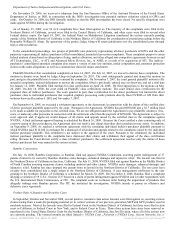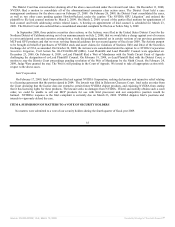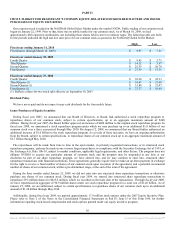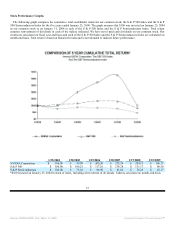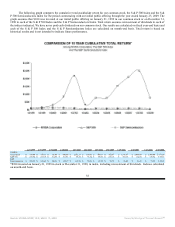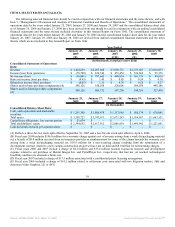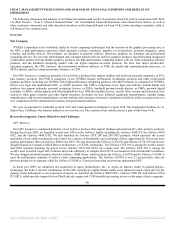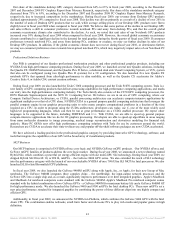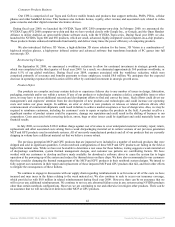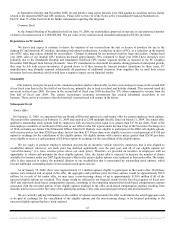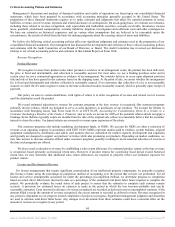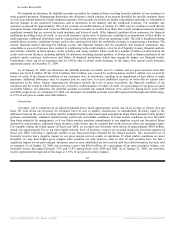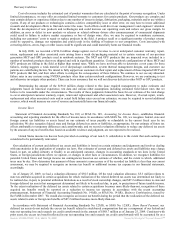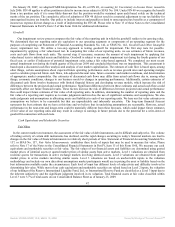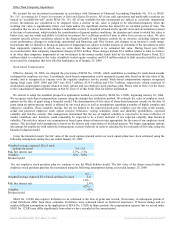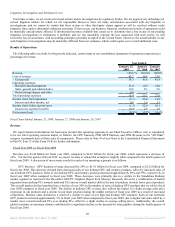NVIDIA 2009 Annual Report Download - page 51
Download and view the complete annual report
Please find page 51 of the 2009 NVIDIA annual report below. You can navigate through the pages in the report by either clicking on the pages listed below, or by using the keyword search tool below to find specific information within the annual report.
Consumer Products Business
Our CPB is comprised of our Tegra and GoForce mobile brands and products that support netbooks, PMPs, PDAs, cellular
phones and other handheld devices. This business also includes license, royalty, other revenue and associated costs related to video
game consoles and other digital consumer electronics devices.
During fiscal year 2009, we launched the NVIDIA Tegra APX 2500 computer-on-a-chip. In February 2009, we announced the
NVIDIA Tegra APX 2600 computer-on-a-chip and that we have worked closely with Google Inc., or Google, and the Open Handset
Alliance to utilize Android, an open mobile phone software stack, with the NVIDIA Tegra series. During fiscal year 2009, we also
launched the NVIDIA Tegra 600 and 650 products, which are small, advanced, highly-integrated visual computer-on-a-chip products.
These products feature enhanced multimedia functionality and deliver many times the power efficiency of competing products.
We also introduced GeForce 3D Vision, a high-definition 3D stereo solution for the home. 3D Vision is a combination of
high-tech wireless glasses, a high-power infrared emitter and advanced software that transforms hundreds of PC games into full
stereoscopic 3D.
Restructuring Charges
On September 18, 2008, we announced a workforce reduction to allow for continued investment in strategic growth areas,
which was completed in the third quarter of fiscal year 2009. As a result, we eliminated approximately 360 positions worldwide, or
about 6.5% of our global workforce. During fiscal year 2009, expenses associated with the workforce reduction, which were
comprised primarily of severance and benefits payments to these employees, totaled $8.0 million. We anticipate that the expected
decrease in operating expenses from this action will be offset by continued investment in strategic growth areas.
Product Defect
Our products are complex and may contain defects or experience failures due to any number of issues in design, fabrication,
packaging, materials and/or use within a system. If any of our products or technologies contains a defect, compatibility issue or other
error, we may have to invest additional research and development efforts to find and correct the issue. Such efforts could divert our
management’s and engineers’ attention from the development of new products and technologies and could increase our operating
costs and reduce our gross margin. In addition, an error or defect in new products or releases or related software drivers after
commencement of commercial shipments could result in failure to achieve market acceptance or loss of design wins. Also, we may be
required to reimburse customers, including for customers’ costs to repair or replace the products in the field. A product recall or a
significant number of product returns could be expensive, damage our reputation and could result in the shifting of business to our
competitors. Costs associated with correcting defects, errors, bugs or other issues could be significant and could materially harm our
financial results.
In July 2008, we recorded a $196.0 million charge against cost of revenue to cover anticipated customer warranty, repair, return,
replacement and other associated costs arising from a weak die/packaging material set in certain versions of our previous generation
MCP and GPU products used in notebook systems. All of our newly manufactured products and all of our products that are currently
shipping in volume have a different material set that we believe is more robust.
The previous generation MCP and GPU products that are impacted were included in a number of notebook products that were
shipped and sold in significant quantities. Certain notebook configurations of these MCP and GPU products are failing in the field at
higher than normal rates. While we have not been able to determine a root cause for these failures, testing suggests a weak material set
of die/package combination, system thermal management designs, and customer use patterns are contributing factors. We have
worked with our customers to develop and have made available for download a software driver to cause the system fan to begin
operation at the powering up of the system and reduce the thermal stress on these chips. We have also recommended to our customers
that they consider changing the thermal management of the MCP and GPU products in their notebook system designs. We intend to
fully support our customers in their repair and replacement of these impacted MCP and GPU products that fail, and their other efforts
to mitigate the consequences of these failures.
We continue to engage in discussions with our supply chain regarding reimbursement to us for some or all of the costs we have
incurred and may incur in the future relating to the weak material set. We also continue to seek to access our insurance coverage,
which provided us with $8.0 million in related reimbursement during fiscal year 2009. However, there can be no assurance that we
will recover any additional reimbursement. We continue to not see any abnormal failure rates in any systems using NVIDIA products
other than certain notebook configurations. However, we are continuing to test and otherwise investigate other products. There can be
no assurance that we will not discover defects in other MCP or GPU products.
42
Source: NVIDIA CORP, 10-K, March 13, 2009 Powered by Morningstar® Document Research℠


